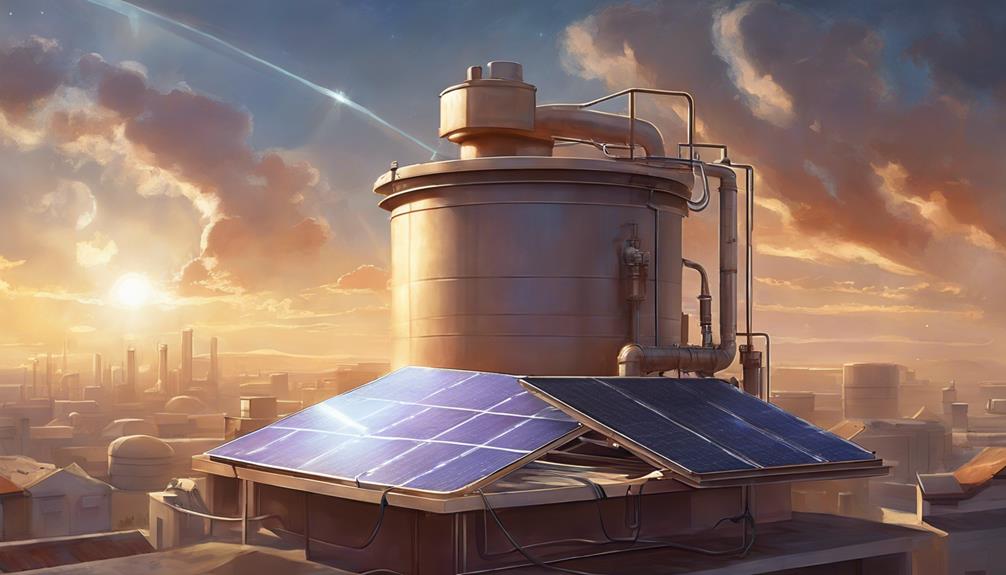Imagine a solar water heating system as a silent, efficient worker harnessing the power of the sun to provide you with hot water.
But how does this innovative technology actually operate?
The principles behind solar water heating systems might surprise you.
From capturing sunlight to transferring heat, understanding the inner workings of these systems can shed light on their environmental and cost-saving benefits.
Key Takeaways
- Solar water heating systems harness sunlight for energy-efficient hot water.
- Components include collectors, storage tanks, and heat exchangers for continuous supply.
- Working mechanism involves converting sunlight to heat, raising water temperature, and distribution.
- Maintenance tips include regular inspection, cleaning, and prevention of freezing for optimal performance.
Benefits of Solar Water Heating Systems

Solar water heating systems offer significant advantages in terms of energy efficiency and cost savings for homeowners. By harnessing the sun's energy to heat water, these systems can greatly reduce the reliance on traditional energy sources, leading to substantial cost savings over time. The initial investment in installing a solar water heating system may seem significant, but the long-term benefits far outweigh the upfront costs.
In addition to cost savings, solar water heating systems also contribute to environmental sustainability. By utilizing renewable energy from the sun, these systems help reduce carbon emissions and dependence on non-renewable resources. This environmentally friendly approach not only benefits individual homeowners but also has a positive impact on the larger community and the planet as a whole.
Components of Solar Water Heating Systems

To understand how solar water heating systems operate efficiently, it's essential to grasp the intricate components that make up these sustainable energy solutions. The key components of a solar water heating system include the solar collector, storage tank, heat exchanger, and pipes.
The solar collector is responsible for capturing sunlight and converting it into heat. It's typically placed on the roof of a building where it can receive maximum sunlight exposure. The installation process of the solar collector involves securely mounting it in a location with minimal shading to ensure optimal energy absorption.
The storage tank stores the heated water until it's needed, ensuring a continuous supply of hot water. The heat exchanger transfers the heat collected by the solar collector to the water in the storage tank. This process is crucial for maximizing energy efficiency.
Pipes connect the various components of the system, allowing the heated water to flow from the solar collector to the storage tank and then to the taps in the building. Proper installation and insulation of these pipes are essential for maintaining energy efficiency throughout the system.
Types of Solar Water Heating Systems

One common type of solar water heating system utilizes a flat-plate collector to harness solar energy efficiently for heating water. These systems consist of a series of interconnected panels that absorb sunlight and convert it into usable heat energy. The installation process involves mounting the flat-plate collectors on the roof or in an area with maximum sun exposure. This type of system is known for its simplicity and reliability, making it a popular choice for residential water heating applications.
| Type of System | Description | Energy Efficiency |
|---|---|---|
| Flat-Plate Collector | Utilizes a flat panel to absorb solar energy efficiently for water heating. | High |
| Evacuated Tube | Consists of glass tubes that trap sunlight to heat water effectively. | Very high |
| Integral Collector | Water storage tank also acts as the collector, simplifying the system. | Moderate |
Flat-plate collectors are known for their ease of installation and maintenance, making them a cost-effective choice for many homeowners. They offer good energy efficiency, especially when combined with proper insulation and system design. Evacuated tube systems are highly efficient due to the vacuum-sealed tubes that minimize heat loss, making them ideal for colder climates. Integral collector systems are convenient as they combine the collector and storage tank, reducing the overall footprint of the system.
Working Mechanism of Solar Water Heating Systems

With intricate precision, solar water heating systems function by harnessing solar energy to efficiently heat water for various applications. The mechanism involves several key steps:
- Solar Panel Efficiency: Photovoltaic solar panels absorb sunlight and convert it into electricity through the photovoltaic effect. This generated electricity powers the system's pump, which circulates water through the system.
- Heat Transfer Process: As the water moves through the system, it passes near the solar panels, absorbing heat from the sun-warmed panels. This heat transfer process raises the temperature of the water.
- Storage and Distribution: Once the water reaches the desired temperature, it's stored in a well-insulated tank for later use. From there, the hot water can be distributed to various applications such as faucets, showers, or heating systems.
Maintenance Tips for Solar Water Heating Systems

Regular maintenance is crucial for ensuring optimal performance and longevity of solar water heating systems. To maintain efficiency, regularly inspect the system for leaks, cracks, or corrosion. Check the pipes, valves, and connections for any signs of wear and tear, ensuring they're tightly sealed. During winter maintenance, it's essential to prevent freezing by either draining the system or using antifreeze solutions designed for solar water heaters.
Efficiency optimization is key to maximizing the benefits of your solar water heating system. Periodically clean the solar panels to remove dust, debris, or any shading that may reduce sunlight absorption. Additionally, ensure that the panels are properly angled towards the sun to capture the maximum amount of solar energy. Inspect the circulation pumps and controls to guarantee they're functioning correctly and adjust settings as needed to maintain optimal performance.
Frequently Asked Questions
Can Solar Water Heating Systems Be Used in All Climates?
In most climates, solar water heating systems are energy efficient but may face installation challenges due to varying sunlight availability. They can be cost-effective long-term, requiring minimal maintenance. Consider local climate factors.
Are There Any Government Incentives or Rebates Available for Installing a Solar Water Heating System?
You can save big with government incentives for solar water heating. Rebates, tax credits, and grants are available. These financial boosts make going solar more affordable and help in long-term energy savings.
How Long Does It Take for a Solar Water Heating System to Pay for Itself in Terms of Energy Savings?
It typically takes around 4 to 10 years for a solar water heating system to pay for itself through energy savings. Factors like installation process efficiency and maintenance costs impact the time frame.
Can Solar Water Heating Systems Be Integrated With Existing Traditional Water Heating Systems?
Yes, solar water heating systems can be integrated with existing traditional systems, enhancing cost efficiency. The installation process involves connecting the solar panels to your current setup. Enjoy energy savings and reduced maintenance requirements by combining these systems effectively.
What Is the Environmental Impact of Manufacturing and Disposing of Solar Water Heating System Components?
When considering the environmental impact of manufacturing and disposing of solar water heating system components, it's crucial to prioritize sustainability. Recycling processes can significantly reduce the carbon footprint, offering eco-friendly alternatives for a greener future.
Conclusion
In conclusion, solar water heating systems harness the power of the sun to provide efficient and eco-friendly hot water for your home.
By utilizing solar collectors and storage tanks, these systems are able to heat water naturally and reduce energy costs.
Remember, when it comes to saving money and protecting the environment, using a solar water heating system is a piece of cake.